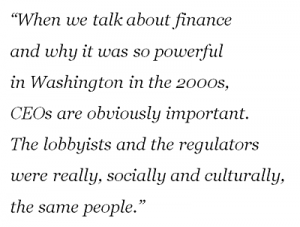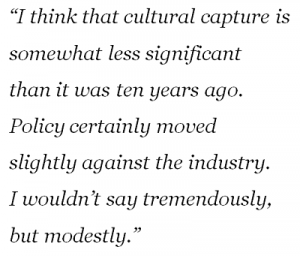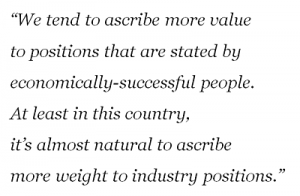University of Connecticut’s law professor James Kwak explains the mechanisms that drive cultural capture, and why he think it is less prevalent today.

In his seminal 1971 paper that introduced the theory of regulatory capture to the world, George Stigler famously used the following words to describe what he saw as the inevitability of special interest groups attempting to subvert competition by buying regulators: “As a rule, regulation is acquired by the industry and is designed and operated primarily for its benefit.”
The traditional capture theory, developed by Stigler and his fellow public choice economists, focused on industry’s attempts to capture regulators by using financial means such as bribes, revolving doors, and political donations. In a 1989 essay, University of Chicago economist Sam Peltzman described it thus: “Politicians, like the rest of us, are presumed to be self-interested maximizers. This means that interest groups can influence the outcome of the regulatory process by providing financial or other support to politicians or regulators.”
Following the financial crisis of 2008, many pointed to the theory of capture as a possible explanation for the regulatory failures that led to the implosion of the financial system. The late University of Chicago economist Gary Becker, for instance, referred to the “disgraceful regulation” of mortgage giants Fannie Mae and Freddie Mac before the financial crisis as an “economically disastrous example of the capture theory.”
But the financial crisis does not lend itself easily to the traditional theory of capture. While many regulators did make decisions that in retrospect went against the public interest, there was no evidence that they did so knowingly or were paid to do so by industry groups. Instead, they seemed to be motivated by a genuine belief that their decisions benefited the public good.
In the years before the crisis, a subtler dynamic seems to have developed in several of America’s regulatory agencies. In 2014, for instance, ProPublica reporter Jake Bernstein revealed secret recordings made by Carmen Segarra, a former examiner at the New York Federal Reserve who was hired to investigate too-big-to-fail institutions and was fired shortly thereafter, following a clash with her superiors. Segarra (who sued the New York Fed for wrongful termination, alleging that she was fired because of her claim that Goldman Sachs has no corporate policy regarding conflicts of interest) secretly made audio recordings of her coworkers during the months that led to her firing.
Segarra’s tapes provided a rare peak into the normally confidential deliberations of the New York Fed, as did a 27-page internal document prepared by Columbia University’s David Beim, also exposed by ProPublica. In one of Segarra’s recordings, she can be heard arguing with her supervisor, who is trying to persuade her to change her opinion about Goldman Sachs. “Why do you have to say there’s no policy?” he asks her.
Beim, who was asked in 2009 by the New York Fed to investigate its supervision of banking institutions, described in his report a culture characterized by a “deference” to the finance industry. “A number of people believe that supervisors paid excessive deference to banks, and as a result they were less aggressive in finding issues or in following up on them in a forceful way,” wrote Beim, who described a culture where regulators effectively protected the firms they supervised. None of them, though, seemed to have been motivated by the kind of material self-interest that according to traditional capture theory is supposed to drive regulatory capture. Instead, their decision-making seemed to have been influenced by non-material considerations, such as prestige and social interactions with representatives of interest groups.
James Kwak, an associate professor of law at the University of Connecticut, calls these non-material forms of influence “cultural capture.” Cultural capture, he explained in a 2013 essay, can produce the same outcomes as traditional capture—“regulatory actions that serve the ends of industry”—but is not as clear-cut. “Regulators are human beings and are therefore subject to the same sets of cognitive shortcomings as other human beings. This implies that they make decisions for reasons other than their material self-interest or their consciously held policy beliefs,” wrote Kwak, who noted that cultural capture “can occur in parallel to the traditional materialist channel.” Because of its vague nature, though, it is also much harder to prove or mitigate.
In the years prior to the crisis, he argued, the financial sector “seems to have gained the cooperation of federal regulatory agencies, not simply by appealing to material self-interest, but also by convincing them that financial deregulation was in the public interest.”

Kwak identified three mechanisms by which regulatory capture can take place. One is group identification: regulators, he wrote, are “more likely to adopt positions advanced by people whom they perceive as being in their in-group.” The second is status: regulators “are more likely to adopt positions advanced by people whom they perceive to be of higher status in social, economic, intellectual or other terms.” The third mechanism is social relationships: regulators “are more likely to adopt positions advanced by people who are in their social networks.”
Kwak, who spent more than a decade in the business world before beginning his J.D., is a prolific blogger at The Baseline Scenario, the popular economics blog he started with his writing partner, former IMF chief economist and MIT professor Simon Johnson. Together with Johnson, he also co-wrote two best-selling books: White House Burning: The Founding Fathers, Our National Debt, and Why It Matters to You (Pantheon, 2012) and 13 Bankers: The Wall Street Takeover and the Next Financial Meltdown (Pantheon, 2010).
In a recent phone conversation with ProMarket, Kwak elaborated on the idea of cultural capture, why he thinks cultural capture is less prevalent today than it was before the financial crisis, and how cultural capture fits into the traditional theory of regulatory capture.
Q: How would you define cultural capture? Is it simply an outcome, or a deliberate strategy?
We can think of it as an outcome more than a strategy. The outcome is that regulators take positions that are favorable to industry. The traditional strategy is essentially more in the vein of the revolving door, or campaign contributions, and so on. The idea of cultural capture tries a different type of strategy, one in which industry essentially attempts to sway regulators through non-material forms of influence. Those can be prestige, or information, things like that.
I started to think about it because, when you think about financial regulators prior to the financial crisis, in many cases they probably sincerely believed they were doing what was right by de-regulating the financial system. You can think about in two different ways: you can think, well, maybe the industry did a very good job arguing their points. The other way you can think about it is that people in Washington were just very, very impressed and kind of blown away by these very rich, very powerful, and very smart people from Wall Street and thought ‘if these really impressive people were saying it, it must be true.’ That’s where the idea came from.
Q: How did the financial crisis affect the kind of cultural capture you describe? Is it more prevalent today, or less?
I suspect it’s become a little bit less prevalent today, because in 2000-2007 you really had a mentality, both in Wall Street and in Washington—some people might call it groupthink—that finance was exciting, it was shiny, it was the future, it was the way. There’s a new book by Steven Cohen and J. Bradford DeLong called Concrete Economics, and they have a short chapter on financial deregulation, where they say that basically that period was one in which the United States was being outcompeted by China [in] traditional industry, and finance was one of the success stories. I think a lot of people believed this is the future, and this is what America will be.
Since the financial crash, things have gotten much more traditional. Now the financial industry is back to the old strategy, which is buying the Republican party. You buy the Republican party and enough centrist Democrats, and you can block anything.

Q: Are you basically saying that following the crisis, the U.S. is reverting to more traditional forms of capture?
I think so. You still get the same kind of arguments from the financial sector, though. One of the famous examples was, three to four years ago The Institute of International Finance published this report saying if you increase capital requirements, it will make the world economy three percent smaller, or something terrible like that. So they still make the same kinds of arguments, saying “we’re not in it for ourselves.” A lot of people don’t believe this nonsense anymore. I think people have become more cynical about the financial industry, which is good. The revolving door is still there, obviously. And the old-fashioned way of buying enough politicians seems to be working quite well.
Q: So, overall, do you think there is actually less capture, cultural or otherwise, within the system today? Recent developments, like the Obama administration’s new regulatory push, created an impression among some people that the attitude among policymaking may have changed.
It’s a matter of degree. I think that cultural capture is somewhat less significant than it was 10 years ago. Policy certainly moved slightly against the industry. I wouldn’t say tremendously, but modestly. The Dodd-Frank Act, the Consumer Financial Protection Bureau, it’s not nothing. You can also see this battle over regulating systemically important financial institutions. Things have gotten tougher.
If we look at outcomes, one of the things that happened with Dodd-Frank is that in some ways it seems relatively strict, but of course every one knows it left a huge amount of scope for interpretation by the regulators. A lot of regulations had ended up being not as tough as they could be, and for the most part they ended up like this because industry comes in and lobbyists come in saying “It’s extremely complicated, and if you do this you’ll ruin the economy.”
One example is the broadening of the definition of qualified mortgage. Qualified mortgages are exempt from some requirements, but the definition is extremely broad, to the extent that it now applies to something like 95 percent of mortgages. That’s an example where the statute was good, and then lobbyists came in and watered it down a lot. Of course, it’s impossible to determine about an individual case whether it was cultural capture.
Dodd-Frank relatively strengthened regulation for a while, but as the crisis recedes further and further into the background, people would get more optimistic and enthusiastic about finance again.
Q: Do you look at cultural capture as a type of thinking or more as policymakers accepting the norms prevalent during a certain time period, regarding prestige and so forth?
That’s a good question. I think certainly there’s an aspect of norms to it. A long time ago, investment banking was considered a boring job, and then for a while in the 1980s it had negative connotations. Then, in the 90s and 2000s, it became very popular. It became the thing everyone wanted to do and gathered these very positive popular cultural connotations. That’s certainly part of it. Among the educated classes, finance was extremely popular. Now it’s divided. At the same time, if you look at things like where college graduates are going to work, they are all going back to Wall Street. That’s what people want to do. It went
down, partly because of the crisis and partly because of the tech bubble that caused college graduates to go to Google or Facebook, but now Silicon Valley is also experiencing a bit of a cultural backlash.
Q: Up until now, we’ve only spoken about finance. Does cultural capture exist, or can it exist, in other industries as well, like tech?
I think it’s most likely. Cultural capture likely has an effect when you have a few conditions. One, the industry is seen as good, or as the future, which is certainly true of technology and not, say, of the coal mining industry. Another condition is that the industry is very technical, because the more technical the topic, the more likely you are to just accept what special interests are telling you.
On the other hand, though, if we think of what technology firms care about, there are often countervailing interests. One thing a lot of technology companies care about is net neutrality, and of course the telecom companies are against it, so there you have a big established interest group opposing them.
One thing about the housing boom in the early 2000s, there really wasn’t a countervailing interest, because to the extent that high finance and securitization and subprime lending had a visible effect on society, it was extending homeownership, which was something both the Clinton and Bush administrations loved.
Q: Following that line of thought, do you claim that cultural admiration of superstar CEOs in the media may contribute to the prevalence of cultural capture?
I think so. When we talk about finance and why it was so powerful in Washington in the 2000s, CEOs are obviously important. The lobbyists and the regulators were really, socially and culturally, the same people. They all went to the same schools, they knew each other. Essentially, people working on Wall Street were the ones who got the best, most prestigious jobs. People looked up to them because of that.
That’s certainly true of CEOs as well. In America we tend to look up to people who made vast amounts of money, assuming they’re really smart, that they must know what they’re doing. That was certainly true before the financial crisis. This deference to the very rich, the tendency of Americans to think that if you made a huge amount of money doing one specific thing you must have valid opinions on other subjects, is a problem. The correlation between the perceived quality of one’s ideas and how much money they’ve made has certainly been a factor. I suspect we’re worse in that regard than other countries, but I don’t really know.
Q: Can academia and think tanks serve to mitigate cultural capture?
I think academics and think tanks could go both ways. There is certainly a history of think tanks being used essentially to inflict what is sometimes referred to as “idea laundering.” If you want a report to go to Congress, instead of the letterhead of JP Morgan you want the letter to have the letterhead of the Brookings Institute.
I think for the most part, this has probably reinforced cultural capture, because also think tanks have a form of a revolving door as well. I think that think tanks provide a veneer of academic respectability for ideas that makes it look less like one-sided industry arguments.
As for academics, they can go both ways. I am an academic myself. There has certainly been a lot of academic research funded by industry. The money is probably less important than the data sometimes, because these days, especially in economics, having the data sources is one of the most important things. So certainly there’s a lot of influence, and a potential for idea laundering.
Academics are supposed to be in the business of evaluating, testing, and sometimes refuting industry claims, but in terms of making the playing field more level so that regulators can see a more balanced set of ideas, I think academics have a very small gun. One of my favorite quotes is one by Gary Gensler, when he was head of the CFTC during Obama’s first term, that said during an interview that 95 percent of his meetings were with banks and industry associations. So basically, regulators are getting a one-sided view of the world. Unless there’s a systematic way to mobilize academic input, it’s essentially not going to change.
Q: Can you explain what you mean by “idea laundering?” Unlike academics who might change their minds when they see new data or theories that they like, think tanks are often more consistent in advocating a certain ideology or worldview.
When people talk about campaign contributions, the question is always “Did somebody give money to a candidate to buy their vote, or did they do it because they support their position?” The same thing applies to think tanks. Whatever industry you are, whatever your ideological persuasion, you can find a think tank that agrees with you and give them money so they can do research in your area. Sometimes if there isn’t one, you have to start one. For instance, the restaurant industry has a think tank. You can make a policy that would be very good to your industry [in making it] look more respectable if you can funnel it through a think tank. The number and variety make it not that hard to find one that would honestly be willing to give it legitimacy.
Q: We have recently heard certain voices criticizing so-called “executive impunity”: Senator Elizabeth Warren, for example, has recently highlighted 20 cases in which federal prosecutors did not bring large corporations or executives to account. Similarly, in an interview with ProMarket, ProPublica journalist Jesse Eisinger, who investigated why no top financial executives were successfully prosecuted after the financial crisis, claimed that “the United States has lost the will and ability to prosecute top corporate executives.” Do you agree with their argument? If so, do you think this supposed impunity might be connected to cultural capture?
I think there are two issues here: one is, if you ask the Department of Justice, they say that under the law we can’t have a criminal prosecution if we would have to prove something we can’t prove. That’s the standard excuse.
If there’s any potential at all for criminal prosecutions, I think the cultural factors we were talking about would essentially make such a prosecution impossible. First of all, if we look at CEOs as heroes, it’s very difficult for regulators and prosecutors to see certain CEOs as criminals who should go to jail—partly because they’re very rich, partly because they say “we just made a business mistake.” So even though they caused an enormous amount of damage, the idea is that they’re just trying to make lots of money and pushing the envelope,
and culturally that is something that Americans admire.
There have been people who’ve gone to jail, like Bernard Ebbers from WorldCom, or Enron’s Jeffrey Skilling and Ken Lay, all because of accounting fraud. The thing is, when there’s a judgment call, the CEOs and executives get the benefit of the doubt in this country.

Q: So far, we’ve talked about cultural capture as a phenomenon related to big business, but what about big government? Should we not be afraid of cultural capture on the part of big government?
I generally don’t think government is able to cause capture, for two reasons: I don’t think government has its own interest in mind that it wants to pursue—though of course many scholars would say it does, and certainly there are agencies that have their own interests in mind. The other reason is that in general, the government is held in pretty low regard in this country at the moment. The attitude on the Republican side since Reagan and among Democrats since Clinton has been essentially that government is a necessary evil. Even on the Democratic side, the idea is that if the private sector can do it, they should, and if the markets can do it, they should.
I think there are agencies that have a more distinct sense of mission, as opposed to the private sector. The EPA is often described that way, that people actually go to work at the EPA because they want to protect the environment and see their interest as opposed to the industry. It’s not really capture, but those cultural values are very important. The CFPB is another agency with a mission.
I think [prior to the crisis] most banking regulators saw their mission as two-fold: to protect banks and to extend the free flow of capital. Their sense of the mission was very consistent with the banks’ mission, so they felt they were working together. I think with the EPA and the CFPB, you don’t get that.
Q: You mentioned a sort of admiration among regulators to their successful peers in the private sector. If this is indeed true, do wage gaps between regulators and the CEOs and officers of the companies they regulate contribute to this?
I think that’s true. There’s a material aspect to that as well, that’s what the revolving door is all about. The challenge is that when regulators make a decision, it’s hard to tease out their motivation or what affected their decision more. In the paper, I talk about the effect of prestige and status, and I think that there’s a very good chance that the higher social status of lobbyists and bankers does play a role. It may very well be subconscious.
I think a lot of people, when they look at people working for the government, they think “If they were really talented, they would work for the private sector and make ten times as much of money.” That belief, I think, is pretty pervasive. We tend to ascribe more value to positions that are stated by economically-successful people. At least in this country, it’s almost natural for people to ascribe more weight to industry positions. To the extent that these agencies are meeting with representatives of the financial industry more than they do with consumer advocates and unions, that’s going to be a challenge.
Q: Given your claim about the prevalence of cultural capture in the years before the crisis, what were the effects? For example, did cultural capture affect the enforcement of antitrust rules and regulation?
Strictly speaking, antitrust doesn’t apply that much in the financial sector—in banking, at least—because in the U.S., for antitrust laws to apply, you have to be even more concentrated than our banking industry is. But what I would say is that within a longer historical perspective, it is possible that cultural capture could be significant in relation to antitrust, for two reasons: one is that in the 1980s there was a big change in antitrust doctrine in the United States. The current doctrine, which has been in place since the 1980s, is that all that matters is consumer welfare, so an antitrust case ends up being an economic analysis of whether prices will go up or down for consumers. This has very little to do with power, which is what antitrust was essentially about. Whether we call it cultural capture or not, this set of values, which in the last few decades became the sophisticated way to look at this this issue, was very important.
The other thing is, again, when two big cable companies want to merge, you have very successful, very rich people talking about economic efficiency. The cultural capture dynamic especially favors that kind of argument.
Q: How do you compare your view of capture—cultural capture—to George Stigler’s classic capture theory?
I certainly agree with Stigler’s idea of regulatory capture. I don’t see myself as opposed to Stigler at all. I feel like if we look at the idea of cultural capture instrumentally from the standpoint of industry, it just expands the set of things they should be doing in order to capture regulators.
As far as prescriptions, I don’t think we should just give up, whereas Stigler might have said that this will always happen, so maybe we should not regulate industry at all. I am somewhat pessimistic about the ability to regulate industry, but I believe one must try. Maybe Stigler would have said that doesn’t make sense. But from a diagnostic standpoint, I don’t think there’s really any tension.
Q: You said earlier that bankers and CEOs are not as admired as they were before the crisis. Some polls indeed show that Americans in general feel negatively toward the finance industry. Is it possible that such public outrage, whether justified or not, trickles up to policymakers, thus perhaps mitigating the effect of cultural capture?
I think that attitudes have changed somewhat. I would say the attitudes have changed both among politicians and the agencies. I would say the crisis has maybe emboldened politicians and regulators to contest the claims of the financial industry. They have been fighting pretty hard to label some non-banking companies and financial institutions as systemically important, which I think would not have happened before the crisis.
Maybe it’s partly because of the Federal Reserve, which is
the most independent regulator. I think the Federal Reserve was kind of embarrassed about the financial crisis. Regulators really don’t like to be embarrassed, and 2008 was an enormous embarrassment. That memory will help make them more stringent for a while. Of course, the memory will fade.
Q: From your characterization of cultural capture, some might understand the term as referring to a deliberate strategy. Do you claim that cultural capture is something that firms actively pursue, or rather something that naturally happens as a result of close relations between regulators and industry?
I would say it’s not conspiratorial. I would say that to some extent, cultural capture is a natural side effect to the way business is done. It’s a side effect to the lobbying advantage that the banks have.
If you were the head of the Financial Services Roundtable, and you were to read my chapter on cultural capture, you might say “If that works, we should try to exploit it even more.” You might try to have more social interactions with regulators. In the business world, when we were going to call on somebody from a big company, we just tried to find as many social connections we could. Similarly, firms might try to maximize the potential for informal interactions with regulators, as opposed to thinking it’s just about the revolving door. They may be doing that already.
Q: Do you characterize cultural capture as a principal-agent problem? Or as a collective action problem, similar to what Bo Rothstein calls a “social trap,” where few within the system have an interest in shaping institutions that can prevent regulatory capture and the incentives and norms that lead to it? The characterization of the problem would affect the solution we should think of—should we think of incremental policies that better align the incentives of the agent with those of the principal, or should we think (as in Rothstein’s argument) more of a “big bang” type of social and political change?
I am kind of pessimistic. If there’s one lesson from Dodd-Frank, I think it’s that the statute should be simpler and more black and white. That counters the last 40 years of financial regulation and introduces problems of its own, but if there’s a lesson, the lesson is less regulatory discretion, to reduce the potential impact of regulatory capture.
Of course, legislators themselves have their own capture issues. Stigler wasn’t talking just about regulators, he was talking about all policymakers. One might hope that with legislation, things are somewhat more transparent. Legislation isn’t transparent, but it’s more transparent than regulatory policymaking.
The simpler the statute, the more subtle types of capture are less likely to come into play. If Dodd-Frank said banks could have a certain amount of assets, we wouldn’t have to worry about judgment calls that could be potentially influenced by industry.
The other potential set of solutions, things that you could do within agencies, is to try to structurally change the way decisions are made. I don’t have any examples of this being done successfully, but for example in psychology there’s a thing called debiasing—the things you could do to eliminate biases in decision-making. If you could have the institutional equivalent of that, those kind of structural changes might help.






